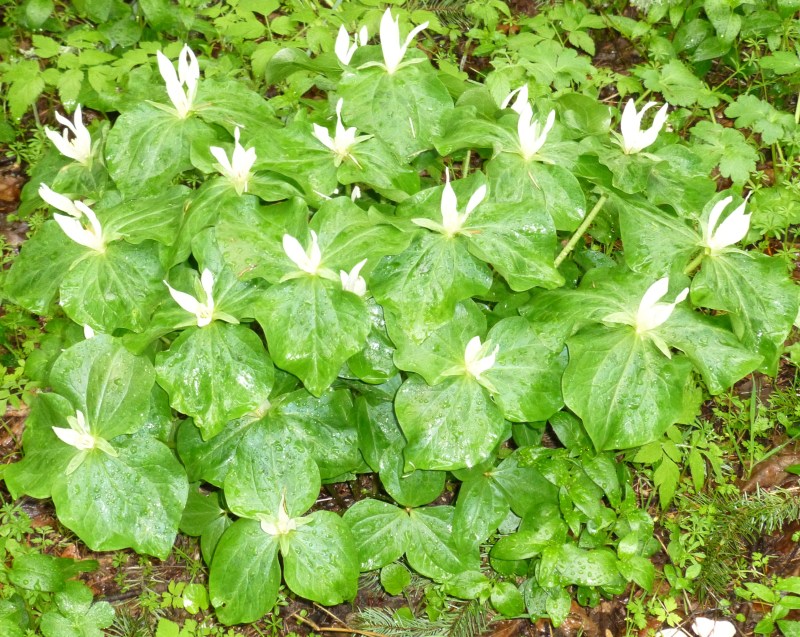This material is copyright by Madronna Holden. Not for citation without permission. Feel free to contact me if you wish to use it.
Nina Baumgartner joked she had adopted so many children she “lost count”. She was living at Taholah, on the Quinault Reservation, in 1975 when I visited here. Whenever I was there, the door of her house was ajar to the outside. It was an old tradition: pioneers had a good deal of difficulty getting the Indians to respect closed doors—for the Indians made doors for creating passage between inside and out, not barring it. The door to Baumgartner’s house was still open.
One day as she told me stories, two young men were in the kitchen, making chowder from a recent catch of clams, and Baumgartner’s daughter was sitting at the table listening to the stories her mother told. At one point a small girl of perhaps three toddled in through the open door from somewhere outside, pressed a flower into Baumgartner’s hand, and left again. Baumgartner thanked her without missing a beat of her story.
“This white lady, I’m not going to call her name because she was just one of many, and it was very common for the white people to leave their children after they were having such a hard time– the new people that came over– to let the Indians take their children because the Indians had a lot of food…
And this white girl had a new baby…They told her, “You have a beautiful little girl.”
And she was just hysterical and she said,” I will not keep that girl. I wanted a boy…I don’t want that baby. Take it away! “..
So they said, “Well, this Indian lady just had a new baby. Maybe she’ll take the baby”…
So somebody went over and spoke to my grandmother, said, “This lady had a new baby and she doesn’t want this baby. It’s a little girl. Would you take this little baby — she’s a white baby?”
And my grandmother said, “Well I guess I could take her. Another baby won’t make much difference. So bring the baby over. But bring some clothes over for the baby, because I just have enough things for one baby”…
My grandmother’s name was Frances. They said, “Yes, Frances will take the baby.”
And so they packed this new baby… over to… [My grandmother and she said,] “And so this is the baby that nobody wants. Well, I want her. I’ll take her.”
And they brought over a bunch of clothes… And it was all blue because this lady wanted a boy.
So my grandmother then had two babies…They said my grandmother took care of that baby just like it was her own baby. My father didn’t have any better treatment than this little girl. In fact, my grandmother was glad to have a little girl…And well, this little girl grew up with the Indians. Ate Indian food. Until she was about four or five years old, when this white mother realized that she would like to have that child.
And she came over to my grandmother’s lodge. And this white baby that my grandmother raised, when she saw those people coming, she started screaming. She was scared of them… She…says, “Who are they? I don’t want those Postons [white people] over here!” She spoke Indian…
[Her mother] said, “That’s why I come after you because I don’t want you to be speaking Indian. I want you to speak English.”
…[The little girl] said, “I speak English too, but my mother speaks Indian, so I speak with her.”
[Her mother said], “That’s not your mother. I’m your mother.”
And this little girl said, “You’re not my mother. Here’s my mother, right here.” And this little child was old enough to realize the one that took care of her.
And then this lady said, “You’re coming home with me. You better gather your stuff…”
And this little girl began screaming… “I’m not going home with you! I’m staying with Mama!”
But finally, after all this commotion… my grandmother stood up…for her rights. She said, “Now, let me tell you something. There was a time when you didn’t want this baby. You absolutely refused to take your own child. And they brought this baby to me and I think I’ve got something to say…I [will] tell this baby who her mother is, and let her get acquainted with you before I let her go. Right now, you’d better go home.”
And this white lady said, “I’m not going home…This is my child and I want her home.”
And this Indian woman, she said, “I don’t care if this is your child, I’m the one raised this child and gave her the love you didn’t give her… And so… when I get ready to relinquish this child, you can come and get her. But I’ll tell you, she won’t be happy with you, because she knew at one time you didn’t want her.”
So this lady said, “Okay, but when I come back, I want you to have her stuff all ready, and I’m going to take her home.”
And in the meantime, this little child was so shook up and she was screaming, “I don’t want to go home with that Poston.”
So [my grandmother said], “Well, you better go home now and I’ll quiet her down.”
So the next time she come over… grandmother acquainted this girl with the idea that she didn’t belong to my grandmother. Her mother was white and her father was white. So she finally went home. But she wasn’t a bit happy with her new mother, which was her natural mother…because she was raised among the Indians…And to the day this lady died, she could speak just as good Indian as the Indians. And she was very good to us… She gave my mother a lot of things we didn’t have, couldn’t afford… we just took it for granted that she wanted to give us those things. We didn’t take that as pay for raising her…
I’ve heard this story many times, not only from my people, but from different people that knew my folks and they were so glad that my grandmother took this baby when nobody else wanted her. So, many times I’ve taken little children that nobody wanted and brought them over to my home. And I kind of inherited the love of children from my grandmother… I have boys that I’ve sent off to college that I took as little babies… And so I think I inherited the love of children from my grandmother. She took this little child and raised her as her own. Gave her the love that this natural mother didn’t want to give her baby. So that’s my story about this child that wasn’t wanted. And we’re living in a day that a lot of children are not wanted. And that’s why we have a lot of foster homes and I feel sorry for the children that have to live in foster homes because a lot of the foster homes are not just the right people to have. I see a lot times in the paper where a lot of children are mistreated—abused.
So my advice to anybody, any parent: love your children and they will return your love.”






































Yet another example of how girls were devalued by a domination society. I understood the natural mother’s fear of trying to feed her child during the hard times, but I wonder if she would have so easily given up a male child.
I recently stayed on Lake Quinault and during a tour of the lake, I saw the reservation and fishing area, so in reading this I could visualize the setting and understood how difficult it was for the settlers who were unfamiliar with the area.The Native Americans were generous with their food and I believe Nina Baumgartner’s grandmother could not understand how a mother could give up her child, but was willing to raise her. I’m glad she stood up to the natural mother when she tried to reclaim her child, although she eventually gave the child back.
Hi Kate,
Thanks for your comment. It seems to me that Nina Baumgartner’s story emphasizes how it was precisely because this child was a girl that this pioneer mother did not wish to accept it. Thus she and her husband had the baby’s room all decked out in blue in the hopes it would be a boy–and when a girl came, she didn’t fit.
We don’t know is what motivated this mother: there is an intimation that the frontier was no place for women (herself included). You also make an interesting assumption– that they could not feed this baby. But that does not indicate why the fact that it was a girl rather than a boy motivated her mother to give it away.
Certainly things to ponder as we all view the history that precedes us on this land.
This is a wonderful example of how the role as a nurturer is also seen as the role as a leader. The nurses in the hospital saw something in the Indian woman that she trusted and recognized that she would be very capable of caring for this child. The Indian woman was obviousley revered in her community and was well respected as a caregiver-a nurturer and was not looked down upon because of her role. She is obviousley a woman of strength because it could not have been easy to raise this child and then to give her back to a woman that she felt would not care for her as she had.
A caring response, Kelly. Nice idea about the ways in which nurturance expresses leadership as well.
Just as a fyi point, there wasn’t any hospital involved. This story takes place on the Olympic Peninsula during the frontier period, so this woman had her child at home.
I am a Chehalis Indian and I knew Nina. In fact 1 of my first cousins was married to her daughter. When I read the story, I was fortunate to “hear” it read in Nina’s soft soothing voice. Thank you.
Wonderful, Elaine. I am happy to meet you. I feel very fortunate indeed to have sat with Nina and heard such stories.